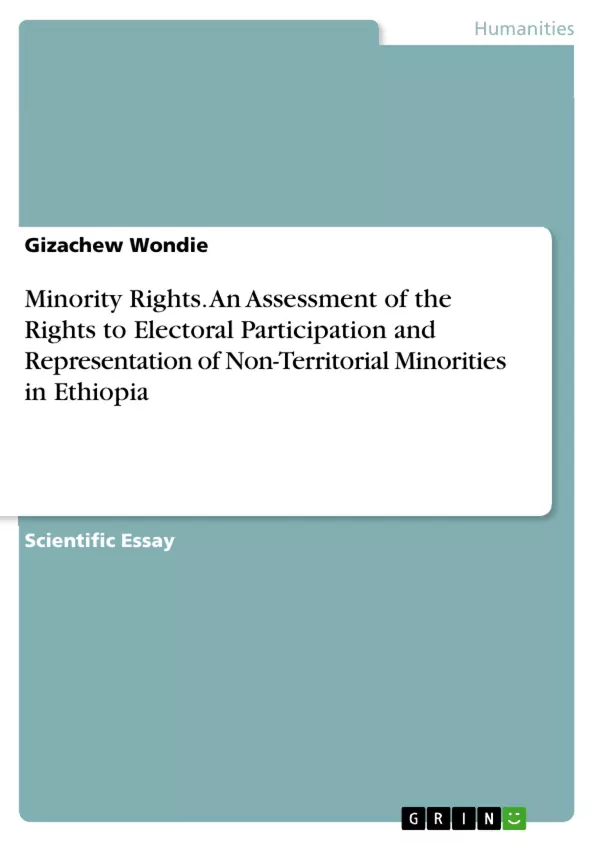This paper attempts to assess the rights to electoral participation and representation of non-territorial minorities in Oromia Regional State/Ethiopia. In doing so, secondary documents like, journal articles, books, Magazines and reports were used. Data’s were also collected from different Medias and newspapers to get the full picture of the study issue. Accordingly, the paper generalizes that the Oromo use the regional autonomy for complete identification of their ethnic group and the nonterritorial minorities clearly lack legal and institutional protection in the regional states.
Ethiopia designed ethnic based federal state structure to respond to the challenges of minorities by developing a counter-majority institutional system. However, the ethnic based federal state structure also creates local tyranny which will further complicated the challenges of minority rights at the local constituent unites of the federation. More importantly, the ethno-territorial organization of the federating unites of Ethiopia left a number of non-native peoples of the country out of the constitutional recognition under the regional constitutions.
As one of the regional states of Ethiopia, Oromia Regional State, the largest in size and number of residence, is the major regional state which large number of non-territorial minorities are found. The allocation of home land for each major ethnic group in the country complicated the right of these dispersed non-territorial minorities in the regional state.
Inhaltsverzeichnis (Table of Contents)
- Introduction
- Background of the study
- Statement of the problem
- Objective
- Conceptualizing Non-Territorial Minorities
- Non-Territorial Minorities Under International Human Right Regime
- Non-territorial minorities in Ethiopian
- Non-Territorial Minority rights in Oromia regional state
- The right to elect and be elected of non-territorial minorities in the region
- Representational rights of non-territorial minorities in the region
- Mechanism of protecting the rights of Non-Territorial Minority in Oromia regional states
- Institutional protection mechanism of Non-Territorial minority rights
- Constitutional protection mechanism of Non-Terrorial minority rights
- Conclusion and recommendation
Zielsetzung und Themenschwerpunkte (Objectives and Key Themes)
This paper aims to assess the rights to electoral participation and representation of non-territorial minorities in the Oromia Regional State/Ethiopia. The study analyzes the legal and institutional frameworks surrounding these rights, examining the challenges faced by non-territorial minorities in accessing political participation and representation within the regional state. The study utilizes secondary sources such as journal articles, books, magazines, and reports to gain a comprehensive understanding of the issue.
- The complexities of ethnic federalism and its impact on minority rights
- The legal and institutional frameworks surrounding non-territorial minority rights in Ethiopia
- The challenges faced by non-territorial minorities in accessing electoral participation and representation in the Oromia Regional State
- The role of regional autonomy and the potential for exclusion of non-territorial minorities
- The importance of constitutional recognition and language prerequisites in shaping minority rights
Zusammenfassung der Kapitel (Chapter Summaries)
- Introduction: The introduction sets the stage for the paper by outlining the background of the study, stating the problem, and defining the objective. It highlights the tension between the desire for ethnic equality and the potential for local tyranny within Ethiopia's federal system.
- Conceptualizing Non-Territorial Minorities: This chapter delves into the definition of non-territorial minorities under both international human rights frameworks and the specific context of Ethiopia. The chapter explores the constitutional recognition and rights of non-territorial minorities in the Oromia regional state, examining their right to elect and be elected as well as their representational rights.
- Mechanism of Protecting the Rights of Non-Territorial Minority in Oromia regional states: This chapter analyzes the institutional and constitutional mechanisms designed to protect the rights of non-territorial minorities in the Oromia regional state. The chapter explores the effectiveness of these mechanisms and discusses the potential for gaps or limitations in their application.
Schlüsselwörter (Keywords)
This paper focuses on the crucial topics of federalism, ethnic groups, representation rights, electoral rights, minorities, and non-territorial minorities. It examines the interplay of these concepts within the Ethiopian context, particularly within the Oromia Regional State, to shed light on the challenges faced by non-territorial minorities in accessing political participation and representation.
Frequently Asked Questions
What are "non-territorial minorities" in the context of Ethiopia?
These are ethnic groups living in regional states where they are not recognized as the native or majority population, often lacking specific legal protection.
What is the main objective of this study?
The paper assesses the rights to electoral participation and political representation of non-territorial minorities in the Oromia Regional State.
How does ethnic federalism affect minority rights in Ethiopia?
While designed to protect ethnic equality, it can create "local tyranny" where the dominant regional ethnic group excludes dispersed minorities from political processes.
What challenges do non-territorial minorities face in Oromia?
Key challenges include a lack of constitutional recognition, language prerequisites for office, and limited institutional protection mechanisms.
What role does regional autonomy play in this issue?
Regional autonomy is often used for the complete identification of a specific ethnic group, which can lead to the exclusion of non-native residents.
- Citar trabajo
- Gizachew Wondie (Autor), 2013, Minority Rights. An Assessment of the Rights to Electoral Participation and Representation of Non-Territorial Minorities in Ethiopia, Múnich, GRIN Verlag, https://www.grin.com/document/345501



